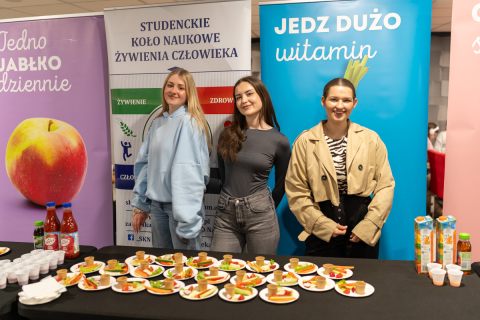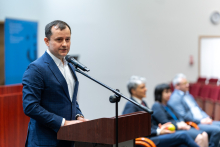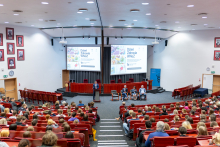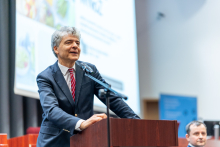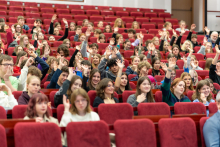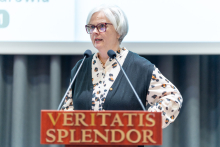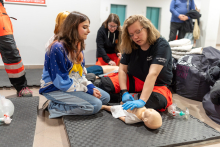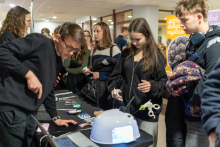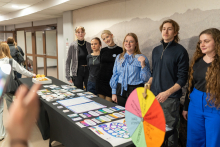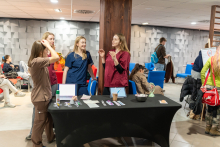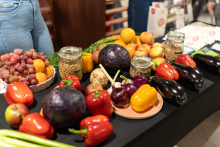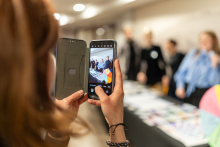The Health Day at the Faculty of Health Sciences took place on 9 April at the Didactic Center of the Medical University of Warsaw. The event, which welcomed nearly 500 young people from 12 Warsaw high schools, was inaugurated by Dr. Łukasz Czyżewski, Vice-Dean for Nursing at the Faculty of Health Sciences.
- “Today, health is a trendy but scarce commodity. You are looking for information about health, and we are licensed to teach about health,” said Dr. Czyżewski. — “Ahead of you are several meetings with lecturers from the fields of nursing, obstetrics, emergency medicine, dietetics, and public health. Our specialists will discuss selected aspects of health in an accessible manner.”
The secondary school students were also addressed by Professor Marek Kuch, Vice-Rector for Student Affairs and Education at MUW.
- “Make good use of this day. Don’t avoid questions,” said Professor Kuch. — “We are accustomed to questions here. The worst thing is when the other side is silent, as it may indicate a lack of interest.”
Ignacy Sakiewicz, a representative of the Faculty of Health Sciences Student Government, also encouraged active participation and inquiry among the students.
Lecture highlights
The main question of this year’s Health Day was: How can young people help their parents and grandparents maintain their health effectively? The topic was introduced by one of the event’s key organizers – Dr. Beata Sińska, Head of the Department of Human Nutrition. The expert emphasized that talking about health can start at the family table, and that discussions about healthier lifestyles can become an important part of strengthening relationships between children and parents, and between grandchildren and grandparents.
Dr. Lena Serafin from the Department of Clinical Nursing delivered an engaging interactive presentation, prompting students to identify the three most important pillars of health. Common responses included physical activity, sleep, and diet. She further discussed Generation Z’s approach to health and their potential role in health education.
Dr Sabina Stadnicka from the Department of Gynecological and Obstetric Didactics addressed the prevention of breast cancer and cervical cancer, highlighting the significance of HPV vaccination for children aged 11-13 years.
Jakub Krawczyk from the Department of Clinical Dietetics presented an interesting lecture titled “Anthocyanins and flavonoids – a tart taste for health and beauty”. He explained what flavonoids are and where they can be found. He also spoke about their anti-inflammatory and anti-cancer properties and their role in preventing heart disease and Alzheimer’s disease.
Karolina Kosiacka, MA, from the Department of Emergency Medicine discussed “Health education in the daily work of the paramedic, or how to increase patient and family awareness”, covering topics such as first aid, lifestyle choices, interpretation of symptoms, medication and senior care.
Dr Paulina Mularczyk-Tomczewska from the Department of Public Health concluded with a talk on fake news and providing guidance on how to avoid misinformation.
Activities at student stands
Following the lectures, students engaged with various student scientific clubs that offered practical advice on healthy lifestyles and preventive healthcare. Activities included learning about composing balanced meals, undergoing impedance analysis (BIA) and muscle strength measurements, checking blood sugar and blood pressure levels, understanding patient rights, and practicing on a laparoscopic trainer.
The students from SKN Emergency Medical Services prepared a professional first aid station, which garnered significant interest. In turn, SKN ProNeo provided demonstrations on neonatal resuscitation. Members of SKN Obstetrics and SKN Ethics used phantoms to teach breast self-examination techniques and answered questions regarding female preventive examinations.
Student scientific clubs that participated in Health Day of the Faculty of Health Sciences included: SKN Human Nutrition, SKN Dietetics, SKN Obstetrics, SKN Emergency Medicine, SKN Start from the Basics, SKN Medical Law, SKN Public Health Promotion Section, SKN Ethics, SKN Fetal Therapy and Perinatology, SKN ProNeo.
In addition to Prof. Łukasz Czyżewski, the authorities of the Faculty of Health Sciences were represented by Dr. Justyna Teliga-Czajkowska, Vice-Dean for Obstetrics, and Dr. Patryk Rzońca, Vice-Dean for Dietetics and Emergency Medicine.
